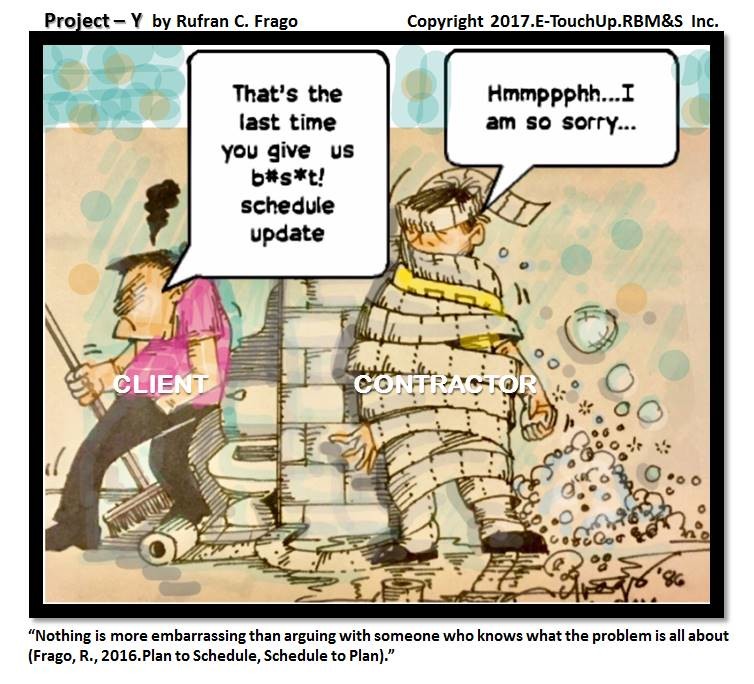Client feedbacks must be clear, with enough details yet to the point. This gives contractor their fair chance. The client expect the same from the contractor. All feedbacks must have a tracking mechanism in place.

Common feedbacks
- Activities actualized beyond (some way beyond) the schedule data date.
- Such activities can affect the calculation the critical path as other activities that comes after them now reside banged on against the data date line making the schedule appear more achievable.
- Wrong information (whether intentional or unintentional)
- Activities reported finished or started but actually not; e.g. a pressure vessel was reported set (installed) a week before the data date turned out to be still inside the construction laydown area.
- Schedule quality has substantially deteriorated

Every schedule must have a benchmarked minimum schedule quality so it remains reliable.
Losing the quality essence of the schedule means the increased possibility of losing stakeholder’s confidence. The project has to avoid such situation from ever happening.
- Contractor’s forecast is not realistic. This becomes a serious issue when repeated several times. This is of utmost importance if client believes the schedule to be late contrary to report.
- Client must be on the lookout for inaccuracies in the schedule by noting variances to previous submittals. Take account of how serious the cumulative errors are and mention it in the transmittal of feedback documents. The combined effect of inaccuracies and errors dictates whether to reject or accept the contractor schedule update.
- Activities reported complete in previous updates but now found revived and active.
- Activities actualized beyond the data date.
- Changes in calendar configuration affect scheduling calculations, usually the unauthorized compression of the schedule.
- Retained logic changed to progress override. If logic connections are to work properly, retained logic must stay.
The accuracy of the schedule update affects its enforceability. This is the reason why contractors and client must agree to the governing parameters of the scheduling tool. It is a fundamental part of the Basis of Schedule document. Sadly, many projects miss to include what the BOS requires until contention starts.
If the Approved Basis of Schedule (BOS) permits or disallows a particular schedule setting, contractors should align with the requirement starting as early as the bidding process up to finalizing the contract. Otherwise, clients will find it difficult and costly if not impossible to get contractors to toe-the-line.
The approved BOS is important to the updating. It covers certain aspects of the process to make them acceptable to all parties like the use of constraints and assumptions on major deliverables.
Constraints overrides CPM date calculations and can make them unreliable. Contractors must be careful placing additional constraints on key contractual dates not found on the BOS without prior consultation with client.
Source: Frago, R. (2015, 2017).Plan to Schedule, Schedule to Plan
Rufran C. Frago, PMP, P. Eng., PMP, CCP, Author
Read “Tips to Effective Project Scheduling Updates Part 1 and Part 2”
Related sites:
- PMSP Products
- https://www.amazon.com/author/rufrancfrago
- Indigo/Chapters
- Your World, Our Risk Universe: WordPress
- LinkedIn Professional Website
Books authored by Rufran Frago
- Risk-based Management in the World of Threats and Opportunities: A Project Controls Perspective.ISBN 978-0-9947608-0-7.Canada
- Plan to Schedule, Schedule to Plan.ISBN 978-0-9947608-2-1.Canada
- How to Create a Good Quality P50 Risk-based Baseline Schedule.ISBN 978-0-9947608-1-4.Canada


